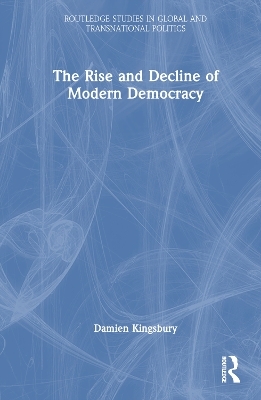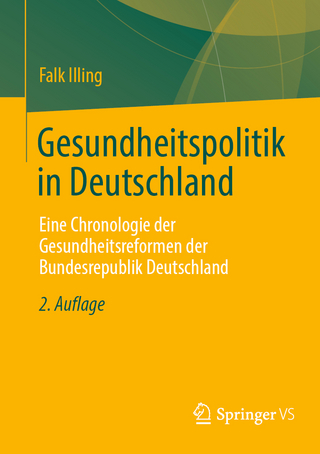
The Rise and Decline of Modern Democracy
Seiten
2023
Routledge (Verlag)
978-1-032-21722-2 (ISBN)
Routledge (Verlag)
978-1-032-21722-2 (ISBN)
The Rise and Decline of Modern Democracy assesses the rise of, subsequent political challenges to, and decline of, contemporary liberal democratic processes, in particular since the ‘third wave’ of democratisation from the 1990s.
The Rise and Decline of Modern Democracy assesses the rise of, subsequent political challenges to, and decline of, contemporary liberal democratic processes, in particular since the ‘third wave’ of democratization from the 1990s.
Democracy is in global decline. Fewer countries are democratic and fewer people, globally, live in substantive democracies. Autocracy is now the dominant political form and the future looks, at best, challenging for the retention of such democracies that remain. As they did a century ago, nationalism and populism have again reared their ugly heads, and more people are claiming that democracy no longer addresses their most compelling needs or interests. This book examines what democracy is and the circumstances that allowed – even encouraged – it to arise. Democracy has been a product of a need to find a political model that mediates between competing interests, building on conducive conditions. However, there have since been fundamental changes to those conditions, imbalances within democratic countries and between countries, that have diminished the strength of the democratic proposition. The question now arises as to whether democracy can continue as a matter of political will. Challengers to democracy, from the radical Right in developed countries to populist autocracy and state-centred authoritarianism in developing countries, have increasingly shown this may not be the case. Democracy may survive, as this book concludes, but is likely to do so only with more substantial and conscious commitment to the democratic project, with recognition of the need to replenish the fertility of the political soil in which democracy grows.
This wide-ranging and empirically and theoretically rich book will be of interest to students, scholars and researchers of political science, international relations, history and democracy.
The Rise and Decline of Modern Democracy assesses the rise of, subsequent political challenges to, and decline of, contemporary liberal democratic processes, in particular since the ‘third wave’ of democratization from the 1990s.
Democracy is in global decline. Fewer countries are democratic and fewer people, globally, live in substantive democracies. Autocracy is now the dominant political form and the future looks, at best, challenging for the retention of such democracies that remain. As they did a century ago, nationalism and populism have again reared their ugly heads, and more people are claiming that democracy no longer addresses their most compelling needs or interests. This book examines what democracy is and the circumstances that allowed – even encouraged – it to arise. Democracy has been a product of a need to find a political model that mediates between competing interests, building on conducive conditions. However, there have since been fundamental changes to those conditions, imbalances within democratic countries and between countries, that have diminished the strength of the democratic proposition. The question now arises as to whether democracy can continue as a matter of political will. Challengers to democracy, from the radical Right in developed countries to populist autocracy and state-centred authoritarianism in developing countries, have increasingly shown this may not be the case. Democracy may survive, as this book concludes, but is likely to do so only with more substantial and conscious commitment to the democratic project, with recognition of the need to replenish the fertility of the political soil in which democracy grows.
This wide-ranging and empirically and theoretically rich book will be of interest to students, scholars and researchers of political science, international relations, history and democracy.
Damien Kingsbury is Emeritus Professor in the Faculty of Arts and Education at Deakin University in Melbourne, Australia. He has written or edited more than two dozen books and several dozen journal articles and book chapters on political and security issues in developing countries.
1 Introduction 2 Drivers of Political Change 3 Ebb and Flow 4 Challengers 5 Compromise 6 Decline 7 The Radical Right 8 The Future is Not Written 9 Conclusion: With a Bang?
| Erscheinungsdatum | 20.03.2023 |
|---|---|
| Reihe/Serie | Routledge Studies in Global and Transnational Politics |
| Verlagsort | London |
| Sprache | englisch |
| Maße | 156 x 234 mm |
| Gewicht | 540 g |
| Themenwelt | Geisteswissenschaften ► Philosophie |
| Sozialwissenschaften ► Politik / Verwaltung ► Politische Systeme | |
| Sozialwissenschaften ► Politik / Verwaltung ► Staat / Verwaltung | |
| ISBN-10 | 1-032-21722-7 / 1032217227 |
| ISBN-13 | 978-1-032-21722-2 / 9781032217222 |
| Zustand | Neuware |
| Informationen gemäß Produktsicherheitsverordnung (GPSR) | |
| Haben Sie eine Frage zum Produkt? |
Mehr entdecken
aus dem Bereich
aus dem Bereich
Eine Chronologie der Gesundheitsreformen der Bundesrepublik …
Buch | Softcover (2022)
Springer Fachmedien Wiesbaden GmbH (Verlag)
59,99 €


